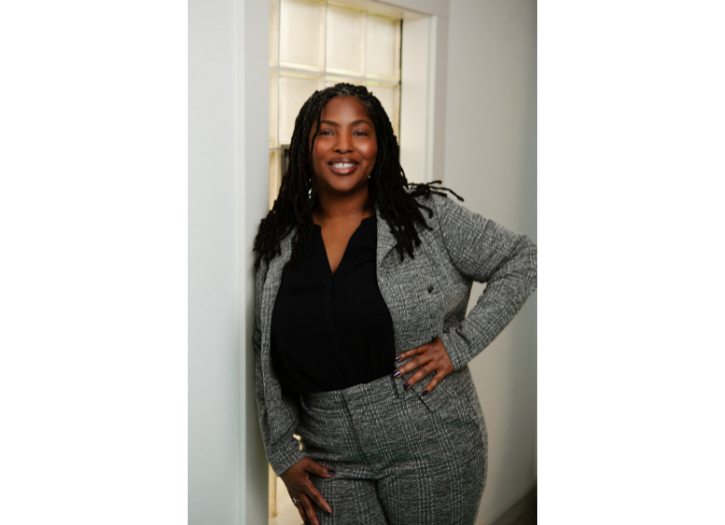Montika Collins, MA, BS, BSN, RN, CLC, IBCLC is emphatic that she was raised by strong black folks. Entrepreneurship and education runs in her blood; so it’s no coincidence that her life’s work as a birthing nurse, teacher, and wellness thought leader would turn into a mission chronicled by the Oprah Winfrey Network.
The Founder of the Given Women’s Health Oasis & Birth Center in Tulsa’s Greenwood District, Montika’s work and deep-rooted commitment to healthy black women, mothers and babies developed into a six-part docuseries featured on OWN and narrated by veteran actor Morris Chestnut.
The REBUILDING BLACK WALLSTREET docuseries displays the rich history of black businesses, landowners and leaders who thrived in the 1920s before the Race Massacre. Montika, a descendent of the Tulsa Race Massacre has been dedicated to re-lifting this vision for the Greenwood community—especially black women.
SHEEN: You are doing some amazing legacy work. As the Founder of the Given Women’s Health Oasis and Birth Center, please talk briefly about the inspiration for this kind of work and why it’s so necessary for women of color?
Montika: The inspiration is really being a black woman and knowing that in my own experiences as a nurse, I have first-hand witnessed women, black women and all women for that matter—it’s hard for me to separate us out because unfortunately in our country when we’re talking about mortality rates, our women in America are dying at rates that are higher than in some third world countries. As astonishing as that is, you multiply that by two, three and four times and that’s where black women are. So I wanted to be a part of that change. When I was little, I wanted to be an Obstetrician. I knew I wanted to deliver babies and as I grew and got older, I really started learning more about birth, biologically normal human birth, the midwifery model of care and actually studying that, researching that and learning that women fair better, especially black women when we receive treatment from other providers of color.
SHEEN: Black women are now leading in business start-ups. How does it feel to have a footprint amongst so many great women?
Montika: It’s humbling. It is definitely awesome. I will say that I was raised by strong black folks. My father was a Vietnam Veteran. My mom was in the service and my dad has a ‘purple’ heart. They got out of the service and then my dad came home. l will say being a Vietnam Vet was interesting because they were treated differently but there were still programs out there so my dad became an Electrical Engineer and my mom was a Design Draftsman. They had their own businesses. I grew up watching my parents and my dad was always entrepreneurial.
SHEEN: To have the Oprah Winfrey Network (OWN) display your life and your work is amazing. To have the story narrated by Morris Chestnut is out of the park. What has that experience been like for you?
Montika: I was not able to meet him. It was really neat just to be able to ‘hear’ Morris Chestnut talking about me, what I’m doing, what our non-profit is doing and the legacy of Greenwood. It’s phenomenal. I don’t even know if it’s all the way real to me. I will also say that Oprah Winfrey is someone who has been inspirational. I grew up in the time of ESSENCE Magazine and seeing that in the beauty shops. I watched Oprah and the shows and there were not many spaces where we could see us. Oprah Winfrey is of course phenomenal and to be chosen to be part of something that she is willing to put her name on and her business is like big. That’s really phenomenal. I really do not have any words for it. I am blessed, honored and grateful that someone with the legacy and stature that Oprah has built felt that we were worth documenting and talking about. It makes the work that I am doing and that we are doing matter. Everyone wants to be seen and heard. That’s a big thing. Even with the women that I deal with. A lot of what I am doing feels worth it. And what kills us in the hospital is that people don’t listen. So when a black woman is saying “hey I am in pain” or “hey this feels off, we are not heard. That’s traumatic within itself. So to have someone like Oprah see me and hear me is phenomenal.
SHEEN: The Given Women’s Health Oasis Birth Center is no easy feat. It takes others to see your vision. How did you know who to partner with?
Montika: That was nothing but God. So when I started this I was in college. I’d gotten a word that I was going to build a birth center. In my mind I felt like I knew where it was going to be, how I was going to get there and all of the things. So I’m walking and trying to be obedient and do what God is telling me He wants me to do. And when the opportunity for this space came up, I felt like every obstacle that we could run into from financing to everything came up. The whole thing has been a labor of love and faith. I started out with some contractors who did not have my best interest at hand. I lost all of the little money that I had and pretty much was trying to figure out how to move forward. I’ve built some really good relationships over the years in the community. I feel like I hear that a lot—relationship, relationship, relationship—but it’s true. Those are things that I was hearing when I was in nursing school and after nursing school to working in the hospital. I joined the breastfeeding coalition and then I was the chair of that. Then I was teaching Leadership and Community at Oral Roberts University. People really knew what I was trying to do and that it was not working and they rallied behind me. I would say when I was out there and trying to do it on my own, I had several missteps. With that being said, I don’t know that I would have gotten the help if people didn’t see me take ownership and put some skin in the game, put my own money behind it and get out there and try even though I was failing miserably. They saw my heart and what I was doing. The community got behind me.
SHEEN: How do you balance it all and who takes care of you?
Montika: I have some really good friends. Me and Cora have known each other and she is one of the Executive Producers on the show. We kind of have a group of us that have been knowing each other for a really long time. We rally behind each other and cheer each other on. I will say that recently I have been taking care of myself more but for a long I don’t feel like I was. I did what most of us do when you first start out and when you have a business. People think that being an entrepreneur is easy, but I work more now for my business than I did when I was at the hospital. They were long hours, but when I was off, I was off. I have two businesses and then I am CEO, Founder and President of the nonprofit organization. I worked full-time in the hospital as a NIC U Nurse, postpartum, mother and baby. I got to the point where I could afford to give myself some help and could focus on me. My body told me—mam shut it down. You’re doing too much. I had to slow down because I can’t leave a legacy if I am not here to finish this race. I’m changing myself. I love to swim and I do Pilates. Really just spending time with God and those types of things have been really, really helpful.
SHEEN: More than anything, what must black women do right now as it relates to their health, wellness and peace?
Montika: Listen to your body. I wish I would have listened to my body before I got to that point. I feel like there were definite signs and it wasn’t until it was debilitating enough to where I couldn’t function to where I was actually listening. I feel like I would not have even gotten to that point if I was doing small things all along. I feel like setting boundaries is a big one and being okay with telling people no. That has been one of the most difficult things in my life—trying to make sure that everybody is happy. My dad use to tell me that you cannot please everybody. You don’t want to ruffle any feathers, make anyone mad or disappoint anyone. I’m working with a Doctor now to get myself together and they asked what could I do to lower my stress. I’m like I have three children. I have all of these different things. My dad died and I was taking care of him and my mom is up in age, so when you’re taking care of your elderly parents and taking care of your young children, it’s a lot. I waited until I was older to have my children because I wanted to establish myself and get all of those letters. I have a lot of responsibility, and people that are depending on me. The root foundation for me is God no matter what. If you have God and you’re listening to Him, then He helps to put those people in place. He helps you to align with those people that can really help you out.







Add Comment